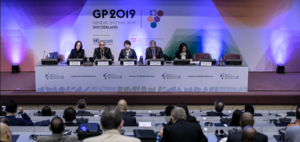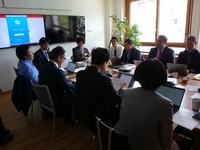13-17 May 2019 (Geneva, Switzerland)
Five key events (or sessions) highlighted the IRP/ADRC engagement at the Global Platform for Disaster Risk Reduction, 13-17 May 2019, Geneva, Switzerland.

Community-led Recovery
One of the panelists of this session is from the IRP Secretariat who shared lessons on community-led recovery as gleaned from the global case studies. The IRP/ADRC presentation affirmed that community-led recovery is a complex process. It entails mobilizing the community to manage programs that are often met with resistance from residents or faced with issues like land tenure, housing designs, and socio-political dynamics of actors involved. The good news is, there are practices, tools, and methodologies that help addressed these issues. Initiatives like 'Setu' in Gujarat, India and 'Machitsukuri' in Kobe, Japan are just a fraction of solution options for the community. The presentation stressed that there is no standard recipe for community-led recovery. So, it is essential for the community to prepare to recover (e.g., pre-agreements, pre-disaster mitigation, and pre-disaster recovery planning) with respect to culture and context.
Fostering Social Inclusion through Culture in City Reconstruction
IRP co-chairs, Joe Leitmann of GFDRR and Setsuko Saya of the Cabinet Office Japan, led this session. Serving as moderator, Mr. Leitmann emphasized that culture can be a powerful building block for social inclusion, risk mitigation, and recovery preparedness. In support of this, Ms. Saya showed how culture played an important role in recovery from the 2016 Kumamoto Earthquakes, where the reconstruction of the Kumamoto Castle serves as symbol. As a cultural heritage, people have strong connection and ownership to the castle that everyone wants to contribute in the recovery process. This session also introduced the Culture in City Reconstruction and Recovery (CURE) framework that integrates both people-centered and place-based approaches to foster social inclusion and resilient recovery.
Build Back Better and WRC Outcomes
In coordination with UNDRR, IRP/ADRC co-organized this working session to draw out experiences, challenges, and lessons in achieving a more inclusive 'build back better' dividend as well as report the 'Outcomes of the 4th Edition of the World Reconstruction Conference'. This session argued that inclusion is vital in 'build back better', and while many policy measures have embraced inclusive agendas, further effort is needed to make these measures more people-centered. In view of this, the panelists committed to push inclusion agenda in recovery programs by promoting opportunities for empowerment, adopting new technologies and solutions for including vulnerable groups, applying an integrated approach to include and connect people, and utilizing new tools for policymakers to address the 'pathways of exclusion'. Ms. Asako Okai, Assistant Secretary General and Director for Crisis Bureau of UNDP, moderated this session with panelists from the Government of Haiti, Government of Indonesia, The World Bank, International Federation of Red Cross and Red Crescent (IFRC), and Japan International Cooperation Agency (JICA).
Steering Committee Meeting
IRP held its 25th Steering Committee meeting at the sides of the Global Platform. Members took the opportunity to announce new knowledge products, strategies, and initiatives at the meeting. These three initiatives were specifically announced: (i) UN-Habitat's knowledge product titled, "Supporting Safer Housing Reconstruction After Disasters"; (ii) WHO's "Health Emergency and Disaster Risk Management Framework Strategy"; and (ⅲ)GFDRR's "Resilient Home Challenge", where architects and engineers were invited to design resilient and sustainable houses that both reduce the risk of damage and enable rapid reconstruction following a disaster. As a knowledge platform on 'Build Back Better in Recovery, Rehabilitation, and Reconstruction', IRP/ADRC will upload these materials in its website for wider dissemination.
IRP /ADRC Side Event
Aimed at gaining further insights on actions that help secure an inclusive build back better dividend, the IRP/ADRC Side Event indicated that 'life recovery' should be the ultimate goal of any recovery process to eliminate the pathways of exclusion. The session acknowledged that 'if the recovery process is not inclusive, it is not better'. The panelists pointed that inclusive recovery requires an inclusive institutional arrangement, a people-centered mechanism of psychosocial recovery, a neutral space for all stakeholders to cooperate, a high regard on social recovery, and a culture-sensitive recovery program. Moreover, inclusive recovery measures have to be integrated the community's pre-disaster recovery plan and budget with consideration to location and capacity of residents. The session identified the following actions to help secure the benefits of build back better in recovery: adopting an installment-based subsidy for community-driven housing reconstruction, engaging 'social networks' in the community pre-disaster recovery planning, promoting homeowner-driven retrofitting, and utilizing a 'village-academia collaboration model' of designing and implementing recovery programs.
(2019/05/24 14:40)
 14 May 2019 (Geneva, Switzerland)
14 May 2019 (Geneva, Switzerland)

